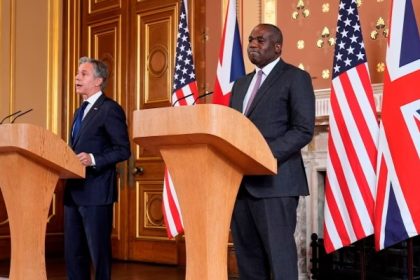
In a coordinated move, the United States, United Kingdom, France, and Germany have imposed fresh sanctions on Iran, accusing the country of supplying ballistic missiles to Russia for use in its ongoing war in Ukraine.
The new measures include restrictions on Iran Air’s operations in the UK and Europe, as well as travel bans and asset freezes on several key Iranians allegedly involved in facilitating military support for Russia.
During a visit to London, US Secretary of State Antony Blinken confirmed that Iranian forces had trained Russian personnel in the use of short-range ballistic missiles. He warned that these weapons could be deployed against Ukraine within weeks. Iran, however, has repeatedly denied any involvement in supplying self-guided missiles to Russia.
At a joint press conference on Tuesday with UK Foreign Secretary David Lammy, Blinken stated that Russian President Vladimir Putin was “increasingly relying on support from Iran and North Korea” in violation of multiple UN Security Council resolutions. According to Blinken, recent intelligence shared by the US revealed that dozens of Russian soldiers had been trained in Iran to operate the Fath-360 missile system, which has a range of up to 120 kilometers (75 miles).
“This is a significant and dangerous escalation,” said Lammy, adding that the missiles would likely boost Russia’s arsenal, enabling it to strike cities near Ukraine’s borders and in areas already under Russian control, while also deploying longer-range missiles further into Ukrainian territory.
The UK Foreign Office stated that the new sanctions targeted several individuals deeply involved in Iran’s ballistic missile and drone supply chains. Among them is Brigadier General Seyed Hamzeh Ghalandari, reportedly the director general for international relations at Iran’s defense ministry, who has been linked to the export of defense products to Iran’s allies. Five Russian cargo ships accused of transporting military supplies from Iran to Russia have also been sanctioned, despite repeated warnings from Western nations.
Additionally, sanctions have been extended to several Iranian organisations involved in the production of Shahed drones, which have been deployed by Russia in multiple attacks on Ukrainian cities. These kamikaze-style drones have caused widespread destruction in civilian areas, drawing international condemnation.
In a joint statement, the UK, France, and Germany—collectively known as the E3—warned that Iran’s provision of ballistic missiles represents “a direct threat to European security.” However, Iranian authorities dismissed the allegations as “false and misleading.”
The imposition of sanctions comes as Russia continues to make territorial gains in eastern Ukraine, with its forces approaching the strategically important settlement of Pokrovsk. UK Prime Minister Sir Keir Starmer has vowed that the UK will support Ukraine for as long as necessary, while Ukrainian President Volodymyr Zelensky has voiced frustration at the slow pace of Western weapons deliveries. Zelensky has also requested permission to strike targets deep within Russia using Western-supplied missiles, but Washington has thus far resisted this request.
During their joint press conference, Blinken and Lammy also announced a planned trip to Ukraine this week. This will be the first such visit in years and is seen as a reaffirmation of the close partnership between the US and the UK, often referred to as the “special relationship.”
Blinken emphasised the importance of hearing directly from Ukrainian leaders about their goals and how the West can best support them in their fight against Russian aggression

